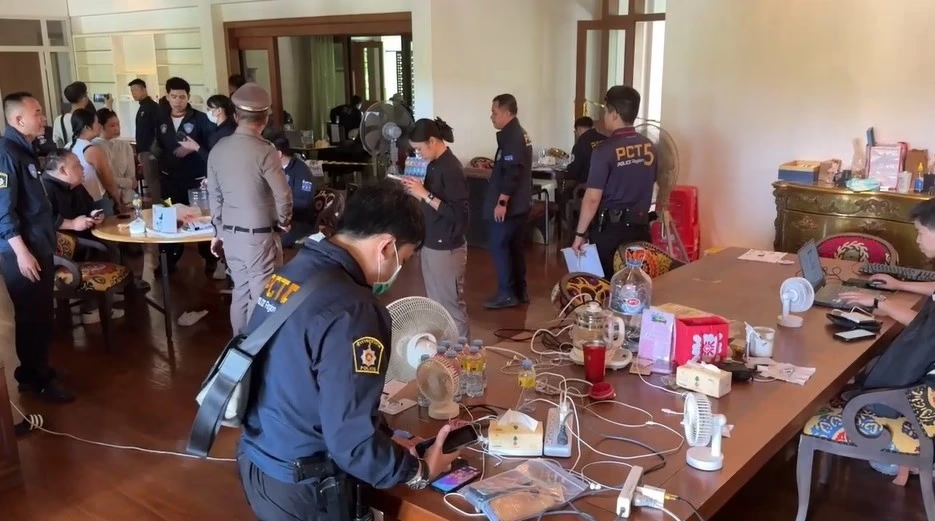CHIANG MAI – On Thursday, Provincial police stormed a Chinese-run call centre hub that paid staff 120,000 baht a month and operated from a luxury riverside pool villa worth about 90 million baht in Mae Rim.
The gang targeted Chinese nationals. Officers arrested 20 Chinese suspects, seized hundreds of mobile phones and a large haul of SIM cards, and are tracking more than 10 others who fled.
Pol Lt Gen Kritthaphon Yisakhon, Commissioner of Provincial Police Region 5, and Pol Lt Gen Thawatchai Pongwiwatthanachai, Deputy Commissioner of Region 5, led Region 5 investigators and PCT Region 5 officers to raid house number 161, Soi 47, Phet Ping Ping Village, Don Kaeo, Mae Rim, Chiang Mai.
The property, a high-end pool villa on the Ping River, had been used as a call centre base for scamming Chinese victims. The compound included the main house and three smaller buildings.
The cordon and search operation led to the arrest of 20 Chinese suspects, 14 men and 6 women. Some were injured while trying to escape. More than ten others ran into the Ping River or fled into nearby woodland.
The villa had extensive CCTV, which alerted occupants to police movement, aiding their escape. Police are pursuing the fugitives. Officers seized over 100 mobile phones, numerous Chinese SIM cards, and platforms used to contact and deceive victims.
Chinese Boss Communicated By Phone
The group is linked to the same network that PCT Region 5 dismantled twice earlier this year, first on 1 July 2025 in Ban Waen, Hang Dong, and again on 30 July 2025 at a pool villa in Ban Nong Plaman, Huai Sai, Mae Rim.
After those raids, the ringleader moved the base and placed Chinese workers in this new villa to keep targeting Chinese citizens. Suspects told police they had lived at the villa for two months. A Chinese boss handled the lease at 120,000 baht per month. Their role was to run call centre operations and phone victims in China.
The scams followed familiar scripts, such as fake parcel problems and bogus life insurance. Recruits travelled from China on tourist and student visas and worked daily from 09.00 to 22.00. Monthly pay ranged from 100,000 to 200,000 baht per person.
Police will expand the investigation to identify all parties in the network. The Chinese Consulate in Chiang Mai will be invited to assist with checks. Initial charges include secret society and criminal association, along with fraud.
All detainees will be sent to investigators at Mae Rim Police Station for legal action. After serving sentences in Thailand, they will be transferred to China to face further proceedings.
Chinese Crypto Fraudster Arrested
Thai police have arrested a Chinese suspect accused of running a major cryptocurrency fraud that allegedly cheated almost 100 people of more than 100 million yuan, about 14 million US dollars, in China.
Officers detained Liang Ai-Bing on 29 October 2025 at a luxury three-storey home office in an upmarket estate in Bangkok’s Wang Thonglang district. He had lived there alone since December 2024, paying 150,000 baht per month in rent, about 4,645 US dollars.
The arrest followed a Criminal Court search warrant executed by Police 191, based on intelligence shared by Thai and Chinese authorities.
Chinese investigators say Liang and four associates, Al Qing-Hua, Wu Jiang-Yan, Tang Zhen-Que, and Zuo Lai-Jun, set up a sham digital currency investment platform called FINTOCH between December 2022 and May 2023.
The group allegedly pushed the fake platform through mobile apps to attract investors. Liang and Tang handled platform development, Al and Wu ran public relations and promotion, and Zuo led marketing.
When the investigation began in China, all five suspects fled, except Zuo. He was arrested and later released on bail while awaiting trial. During the Bangkok raid, officers found an unlicensed Beretta pistol and 20 rounds of ammunition at Liang’s residence.
Liang now faces charges in Thailand for illegal possession of a firearm and ammunition, and illegal entry as a foreign national. Thai authorities are working with their Chinese counterparts to begin extradition. This case underscores the growing risk of cross-border fraud and the use of cryptocurrency platforms to target investors across countries.

















